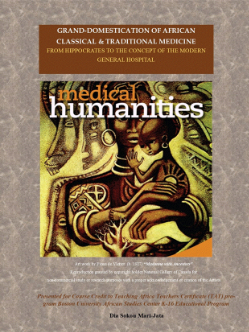Grand-Domestication Of African Classical & Traditional Medicine –...
₵140.00In this book I address and debate “the historical role of cosmopolitan medicine as an instrument of colonial power, state dominance, or social control within the Afro-Atlantic through the study of a variety of ethnographic and contemporary clinical contexts” ; an important topic in the course “Medicine, Religion and Politics in Africa and The African Diaspora” from MIT (Massachusetts Institute of Technology).
African traditional medicine has been in a life and death struggle with the advancement of Western medicine since before the onset of the African slave trade and the “Scramble for Africa” (1885 to 1914). Grand-domestication of African medicine in its classical form as developed by Imhotep (2667 BCE – 2600 BCE), the brilliant Chief Minister, architect, mathematician, poet, priest and physician for Pharaoh Djoser began some 2,140 years later during the classical Greek period; specifically with the Hippocratic writings (460 BCE and 375 BCE) centered at Cos, Greece. Greek classical medicine with Hippocrates credited for the writings and called the “Father of Medicine” is the direct ancestor of European medica a setus. However, the grand-domestication and colonial imposition which arrested African medical development and forced Africans to develop underground systems of traditional African medicine began with the Greek Empire founded by Alexander, the Great. With the reign of the Ptolemaic Greek Dynasty (305 BCE to 30 BCE) domination, exploitation, and segregation of Egyptian medical scholars and physicians from the City of Alexandria was the order of the day. The Greek rulers (Ptolemies) denied them access to their own writings containing African materia medica. Because of this cooption of classical African medicine, African traditional medicine lost any direct transmission from that classical body of knowledge stolen and arrested by the Greeks. The Greeks all of sudden were able to write on any scientific or medical subject in less than few decades that would have taken other nations centuries to accomplish, known as the so-called “Greek Miracle.” That early Greek colonial imposition using grand-domestication separated African traditional medicine from its classical Egyptian roots. Later was interposed a modern aggressive hegemonic European and Euro-American medical system that marginalized all other medical knowledge that did not fit within its medical canon. African traditional medicine was therefore its target of distain denying it had any value or efficacy in and for the healing arts. During the Plantation Era and in much of the Americas African traditional medicine and its doctors and practitioners were held in suspicion and even feared because of the “secret” knowledge that could not only heal in a competitive mode with modern medicine but also kill by “magic” a combination of poisoning and auto-suggestion. Despite the hegemonic impact of European and Euro-American medicine practiced chiefly within the modern general hospital African traditional medicine has not only survived but in many ways, modes and within black controlled political space even thriving. Ghana is one political space where this assertion hold true as well as spaces like Haiti and even the Gullah Corridor and Sea Islands adjacent to South Carolina.




